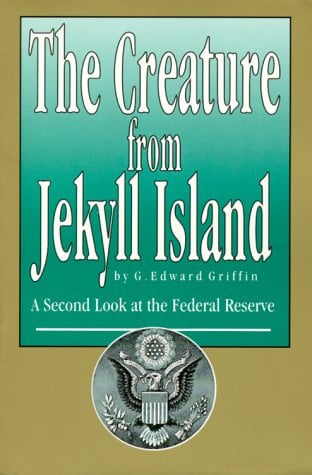 G. Edward Griffin, the author of the seminal book on the formation of the Federal Reserve, The Creature of Jekyll Island, joins the podcast this week to add his perspective to our ongoing critical examination of the Fed and the impact its actions are having on society.
G. Edward Griffin, the author of the seminal book on the formation of the Federal Reserve, The Creature of Jekyll Island, joins the podcast this week to add his perspective to our ongoing critical examination of the Fed and the impact its actions are having on society.
Meeting Ed and getting to spend time with him was a real honor for Chris and me. His breadth of knowledge of the central banking system as well as his engaging manner of storytelling are masterful. Plus, he's simply a wonderfully kind person.
Ed's decades of research and critique of the Federal Reserve, sadly, have left him with conclusions that corroborate our own. Despite its carefully-crafted image as an essential public servant, Griffin concludes it is anything but. It is a private cartel that has connived its way to tremendous advantage and power, secretly (and not-so-secretly) plundering the American people of their treasure and freedoms.
On The Fed's True Goals
[In researching the Federal Reserve] I was looking for a very complex mechanism. And I couldn’t believe at that time that there would be deliberate deception in this system. So, I was working on the false assumption that everybody in the system was doing their best to make it work on behalf of mankind and on behalf of society. Initially, I never entertained the idea that its goal was not to benefit mankind at all.
And so, where one would say, look: the Federal Reserve system is failing to meet its goals -- because it said its goals were to stabilize the economy and to preserve purchasing power, etc. -- I finally came to the realization: No, those are not its goals.If we understand what its goals really are, then it’s not failing at all. It’s succeeding amazingly well.And most people, as I initially did, have found that an impossible assumption to entertain. They simply can't get over it.
On Whether The Fed Is A 'Conspiracy'
Most dictionary definitions of the word "conspiracy" seem to agree that a conspiracy occurs when:
- two or more people come together
- they use methods of deceit and deception to achieve a goal
- which is unethical or illegal.
Those are the three requirements. So talk about the Fed:
Are there two or more people? Oh, yeah. OK, there’s one down.
Do it use methods of secrecy? Yes. It has secret meetings [beginning from its very conception at Jekyll Island] . It has closed meetings in which the public is excluded and the minutes of which are not shared for years, sometimes decades, sometimes never. Yes, of course, elements of the Fed's activities are highly secretive.
And is the result either unethical or illegal? Well, now that’s where it gets interesting.
Because first of all, it’s not illegal what they’re doing -- because the banking industry has heavy influence over the people who write the laws. That’s the reason the banks are so involved in the political system: so they can write the laws. So, that what they want to do is legal.
So, the Federal Reserve is plundering people legally. But is what its doing unethical? The propaganda is that the Federal Reserve is 'stabilizing the economy'. They’re doing it for the American people.
But you and I, or anybody else that’s not on the receiving end of all this money flow that the Fed has created, we look at what they’re actually doing and most of us would say it's highly unethical. Our wealth, our economic prosperity and financial freedom -- all are being siphoned away -- for the benefit of a very small elite few. I think most people who they really understand what the Federal Reserve is doing would agree that’s unethical.
And there’s where you meet the definition of a conspiracy, though I don’t insist anybody call it that. Just call it what it is: a group of people who know what they’re doing and are plundering us.
Click the play button below to listen to Chris' interview with G. Edward Griffin (58m:35s).
This is a companion discussion topic for the original entry at https://peakprosperity.com/g-edward-griffin-exposing-the-creature-from-jekyll-island/